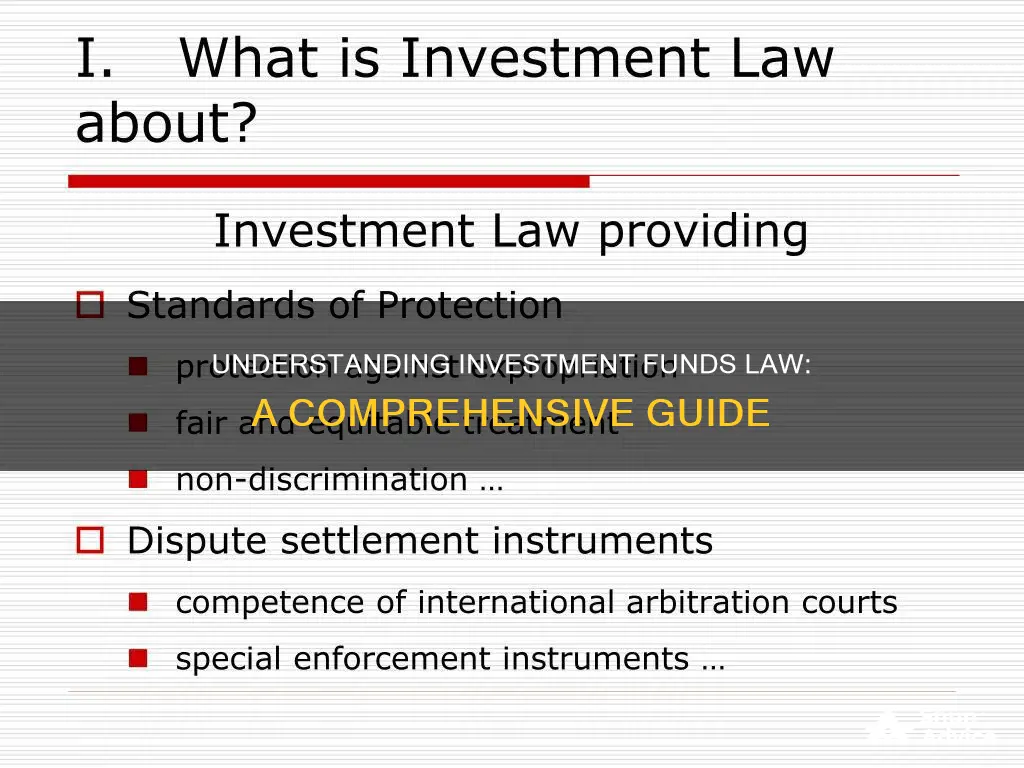
Investment funds law is a legal practice area that involves advising and representing investment funds and their managers on various matters, including fund formation, regulatory compliance, and transactional support. These funds can be private equity funds, hedge funds, mutual funds, or other types of investment vehicles. Lawyers in this field help structure and establish funds, navigate complex regulations, and facilitate investments and divestments. They also assist with tax, employment, and contractual matters, ensuring compliance with applicable laws and mitigating risks. The work of investment funds lawyers is dynamic and often involves collaborating with tax, finance, and other legal professionals to provide comprehensive solutions to their clients.
| Characteristics | Values |
|---|---|
| Role of investment management lawyers | Help to form the fund; help the firm negotiate how investors donate their money; represent the fund when it buys and sells investments |
| Investment management lawyer specialisation | Funds' formation, structuring, regulation and taxation |
| Hedge funds | Private funds that invest in a variety of markets to return a profit to the investor |
| Mutual funds | Collective funds that pool money from several investors to buy securities |
| Open-end funds | Funds that allow investors to add to or withdraw from the fund |
| Closed-end funds | Funds that issue a limited number of shares all at once; shares are traded between investors |
| Real Estate Investment Trusts (REITs) | Publicly traded funds that use investors' money to invest in mortgages and properties |
| Regulatory compliance | Advising on compliance with laws and regulations such as the Investment Company Act, the Investment Advisers Act, the Securities Act, the Securities Exchange Act, the Commodity Exchange Act, the USA PATRIOT Act, and ERISA |
| Investment management experience | Engagement during SEC exams or enforcement actions; development of innovative registered and exempt pooled investment vehicles; providing formation and operations advice to fund advisors; development and implementation of compliance policies and procedures |
| Private equity funds | Structuring solutions for funds worldwide; negotiating governance and economic terms; advising on matters such as commitment defaults, fund restructuring, and taxation |
| Hedge fund lawyers | Structuring seed capital transactions, sub-advisory and funds-of-one arrangements; negotiating side letter agreements for managers |
| Broker-dealer advice | Advising on registration with the SEC and states, licensing and registration requirements, policies and procedures, and supervisory controls |
| Institutional investors | Direct investments, structuring joint ventures, separate accounts, co-investments, and the exercise of governance rights |
| Regulatory capabilities | Advising on compliance with regulations such as the Financial Conduct Authority, European Union Directives, European Alternative Investment Funds Managers Directive (AIFMD), and taxation regulations |
What You'll Learn

Regulatory compliance matters
- Securities Laws and Regulations: Compliance with securities laws is a fundamental aspect of investment funds law. In the United States, this includes adherence to the Securities Act of 1933, the Securities Exchange Act of 1934, and the regulations set forth by the Securities and Exchange Commission (SEC). These laws govern the issuance, purchase, and sale of securities, including the disclosure of important information to investors.
- Investment Company Act and Investment Advisers Act: The Investment Company Act of 1940 and the Investment Advisers Act of 1940 are crucial pieces of legislation in investment funds law. The Investment Company Act regulates companies engaged in the business of investing, reinvesting, or trading in securities, while the Investment Advisers Act focuses on regulating investment advisers and their relationships with clients.
- Dodd-Frank Act and Other Relevant Legislation: The Dodd-Frank Act, enacted in 2010, introduced comprehensive reforms to the financial industry, including enhanced regulatory oversight of investment funds and their advisers. Other relevant legislation may include the USA PATRIOT Act, the Commodity Exchange Act, and the Employee Retirement Income Security Act (ERISA).
- Registration and Exemptions: Investment funds and their advisers must navigate complex registration requirements. This involves understanding the thresholds and criteria for registration, as well as exploring available exemptions. Regulatory compliance matters also entail maintaining proper regulatory filings and adhering to reporting obligations.
- Broker-Dealer and Commodities Matters: Compliance with regulations pertaining to broker-dealers and commodities is essential. This includes registering broker-dealers and their employees with the SEC and relevant states, as well as addressing commodities-related issues such as trading practices and derivatives.
- Global Regulatory Environment: With the increasing globalisation of investment funds, navigating the regulatory landscape across multiple jurisdictions is crucial. This involves understanding the specific regulations and directives in different regions, such as the European Union's Alternative Investment Fund Managers Directive (AIFMD) and the UK's Financial Conduct Authority (FCA) compliance.
- Anti-Money Laundering and Sanctions: Investment funds and their advisers must comply with anti-money laundering regulations and sanctions enforced by various regulatory bodies. This includes conducting customer due diligence, reporting suspicious activities, and ensuring that fund operations do not violate any applicable sanctions.
- Tax Compliance: Regulatory compliance also extends to tax matters. Investment funds and their advisers must navigate complex tax regulations, including those related to cross-border transactions and the tax treatment of different types of funds. Compliance with tax reporting requirements and optimising tax structures are essential aspects of tax compliance.
- Derivatives and Structured Transactions: Given the widespread use of derivatives in investment funds, regulatory compliance matters often involve understanding and adhering to regulations surrounding derivatives and structured transactions. This includes liaising with derivatives experts and ensuring compliance with applicable laws and exchange rules.
- Investor Protection: Ultimately, regulatory compliance matters aim to protect the interests of investors. This includes ensuring that funds provide accurate and timely information to investors, adhere to marketing and solicitation regulations, and maintain robust compliance programmes to mitigate risks and resolve conflicts of interest.
Index Funds in India: Smart Investment or Risky Business?
You may want to see also

Fund structuring and formation
- Legal Framework: Investment fund lawyers play a crucial role in establishing the legal framework for the fund. They draft and review legal documents such as prospectuses, offering memorandums, and partnership agreements. They ensure compliance with securities laws and tax regulations, protecting the fund and its investors.
- Investment Objectives: Funds are structured to meet specific investment objectives. This may include determining the types of investments the fund will focus on, such as stocks, bonds, real estate, or other asset classes. The fund structure should align with the investment strategy and risk tolerance of the investors.
- Investor Pool: Fund structuring involves deciding on the type of investors the fund will target. This could include institutional investors, high-net-worth individuals, or retail investors. The structure may vary depending on the investor pool, as different regulations and requirements apply to each type of investor.
- Fund Type: There are various types of investment funds, such as mutual funds, hedge funds, private equity funds, or exchange-traded funds (ETFs). Each fund type has unique structural characteristics, regulatory considerations, and investor expectations.
- Regulatory Compliance: Fund formation lawyers help navigate the complex web of regulations imposed by regulatory bodies such as the Securities and Exchange Commission (SEC) and the Financial Industry Regulatory Authority (FINRA). They ensure the fund's structure complies with applicable laws and regulations, mitigating legal risks.
- Risk Management: Fund structuring also involves assessing and managing risks. Investment fund attorneys conduct due diligence on potential investment opportunities to identify and mitigate risks. They assess legal soundness, conflicts of interest, and advise on risk management strategies.
- Fund Governance: Investment fund lawyers help establish best practices for fund management and ensure compliance with internal policies. They may serve on fund boards, addressing conflicts of interest and governing the fund's operations.
Overall, fund structuring and formation is a complex and critical process that requires legal expertise and a deep understanding of the financial landscape. It lays the foundation for the fund's operations, investor relationships, and regulatory compliance, setting the stage for the fund's success and longevity.
Mutual Fund Tax: What Investors Need to Know
You may want to see also

Investment management
Law firms that specialise in investment management provide a range of legal services to investment funds, investment managers, and institutional investors. These services include fund formation, regulatory compliance, and representation in various transactions and disputes. Law firms in this area often have dedicated practice groups or teams that focus specifically on investment management, leveraging their expertise and industry connections to advise clients on a range of complex issues.
One of the key areas of focus for investment management law firms is fund formation. This involves assisting clients in structuring and establishing investment funds, including private equity funds, hedge funds, venture capital funds, and mutual funds, among others. Law firms guide fund managers through the legal and regulatory landscape, ensuring compliance with relevant securities laws and regulations. They also help draft offering documents, review investment policies, and advise on governance structures to minimise potential conflicts of interest.
In addition to fund formation, investment management law firms provide ongoing legal support to investment funds and their managers. This includes advising on regulatory and compliance matters, such as registration requirements under the Investment Company Act of 1940 and the Investment Advisers Act of 1940. These laws mandate certain disclosure obligations and set standards for protecting investor interests. Law firms also assist with interpreting and complying with other securities laws, such as the Securities Act of 1933, the Securities Exchange Act of 1934, and subsequent amendments.
Another critical aspect of investment management is representing investment funds and managers in various transactions, including mergers and acquisitions, spin-outs, and the sale or purchase of investment vehicles. Law firms help structure these deals, conduct due diligence, and negotiate on behalf of their clients. They also assist with fundraising efforts, connecting funds with potential investors and ensuring compliance with applicable securities laws during the capital-raising process.
Furthermore, investment management law firms provide guidance on internal governance, risk management, and operational matters. They help investment funds establish robust compliance programmes, develop internal policies and procedures, and navigate complex regulatory reporting requirements. Law firms also advise on employment-related issues, executive compensation, and other benefits-related matters for investment management firms.
In summary, investment management in the context of investment funds law encompasses a broad range of legal and regulatory matters pertaining to investment funds and their managers. Law firms specialising in this area offer comprehensive services to help clients navigate the complex and dynamic landscape of the investment management industry, ensuring compliance, protecting investor interests, and facilitating efficient capital allocation.
Gold Fund Investment: Timing is Everything
You may want to see also

Taxation
The tax rate and treatment of investment products can be complex and influence investor behaviour. For example, in Ireland, different tax treatments apply to products liable to Deposit Interest Retention Tax (DIRT) versus Life Assurance Exit Tax (LAET). There are also inconsistencies between tax regimes, such as the ability to offset Capital Gains Tax (CGT) losses against CGT gains, but no similar relief for losses on the disposal of units in an Irish fund or a material interest in an offshore fund.
The Commission on Taxation and Welfare (COTW) in Ireland recommended that different forms of investment and savings income should be subject to the same level of tax to ensure horizontal equity, and that the level of income should determine the marginal rate payable rather than the type of investment product used. Simplification and harmonisation of the taxation regime for funds, life assurance policies, and other investment products were also recommended by the COTW.
When it comes to cross-border transactions of investment funds and private fund investors in the European Union, tax issues can arise involving domestic tax laws, tax treaties, and EU law. Analysing the tax rules and practices in several EU member states, such as the UK, Germany, France, Luxembourg, and Finland, can provide insights into how these countries navigate the complexities of taxation in the context of investment funds.
In the United States, investment funds law encompasses compliance with various regulations, including the Dodd-Frank Act, the Investment Company Act, the Investment Advisers Act of 1940, the Securities Act of 1933, the Securities Exchange Act of 1934, and the Commodity Exchange Act. Additionally, tax considerations play a significant role in the work of investment funds attorneys, who advise clients on structuring and regulatory matters related to private equity and venture capital funds, real estate investment trusts (REITs), and other investment vehicles.
Overall, taxation is a critical aspect of investment funds law, and attorneys in this field must possess a strong understanding of tax regulations and their implications for different types of investment products and investors.
Money Market Funds: Investing in Corporate Bonds
You may want to see also

Securities
There are three main types of securities: equity, debt, and hybrids. Equity securities provide ownership rights to holders, while debt securities are essentially loans that must be repaid with interest. Hybrid securities combine aspects of both debt and equity.
Public sales of securities are regulated by the Securities and Exchange Commission (SEC) in the United States, which was created by the Securities Exchange Act of 1934. The Act also created self-regulatory organisations (SROs) such as the National Association of Securities Dealers (NASD) and the Financial Industry Regulatory Authority (FINRA) to help oversee the securities industry.
The Securities Act of 1933, often referred to as the "truth in securities" law, requires companies to disclose important financial information to investors and prohibits deceit, misrepresentations, and fraud in the sale of securities.
Other key securities laws in the United States include the Trust Indenture Act of 1939, the Investment Company Act of 1940, the Investment Advisers Act of 1940, the Sarbanes-Oxley Act of 2002, and the Dodd-Frank Wall Street Reform and Consumer Protection Act of 2010.
Manulife Financial: Regulated Mutual Fund Company?
You may want to see also
Frequently asked questions
An investment fund is a pool of money from investors that is used to buy other companies or assets, with the goal of selling them for a higher price. This process is often referred to as a leveraged buyout. Investment funds can be structured as limited partnerships or limited liability companies.
Investment management lawyers help to form the fund, negotiate the terms of investment, and represent the fund during the buying and selling of investments. They advise on fund formation, structuring, regulation, and taxation.
Investment management lawyers work with a variety of funds, including private equity funds, hedge funds, mutual funds, venture capital funds, and real estate investment trusts (REITs). They also advise on secondary transactions, fund restructuring, and compliance with regulatory requirements.







